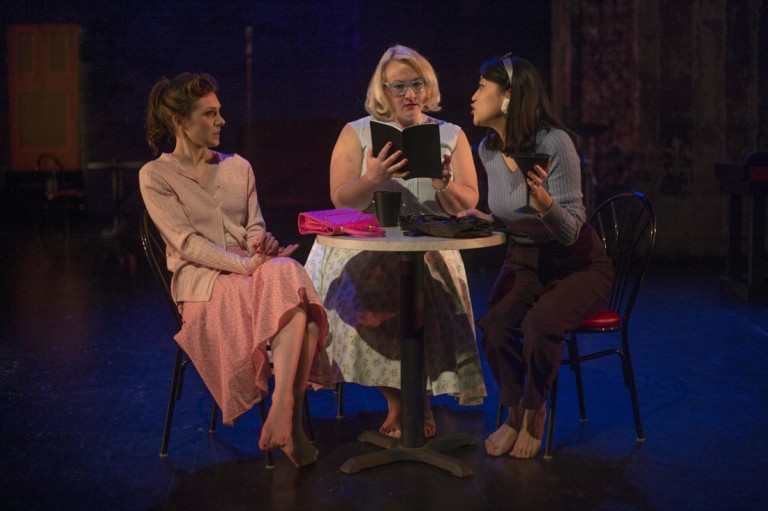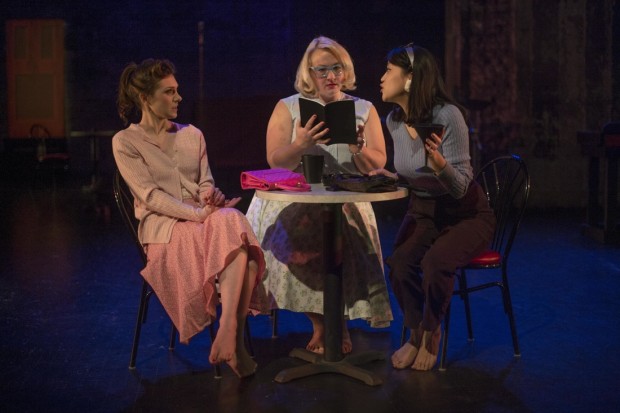

There are things that happen in theatre that I love such as all-female casts, queer stories that don’t end in utter tragedy, and period pieces I haven’t seen a million times before. Then there are things I love that I almost never see in even LGBTQIAP+ art, such as femme-femme relationships, respectful but open conversations about presentation, and stories focused primarily on women who love women. Savage Umbrella’s June covers this and so much more, mostly to a successful and evocative end. June is the story of a baby femme taking her first forays into a pre-Stonewall lesbian world. It’s crucial for young LGBTQIAP+ people to know their history, and the company does a really good job painting a picture of a sparse “girl bar” populated by butches and dykes that love each other and to have a good time — but who live under the constant threat of police violence and general strain of a sexually repressed 1950’s society.
Savage Umbrella is very well-known in the Twin Cities theatre community as one of the few companies we have devoted to ensemble-led, original works created in house. They also have a specific aesthetic that is hard to put into words, but you know when you’re at a Savage Umbrella show what that aesthetic is, and part of that is in the way they create their pieces — immersively. Savage Umbrella tells you where you are and makes you feel like part of the action without the awkward (for those of us with social anxiety) audience participation requirement from the moment you walk into the door. They normally do this with lobby decorations and various other pre-show components. Unfortunately, at the Southern Theater, they’ve had to take steps away from that as they don’t have total control of the space. I bounded up to the door, excited to be sucked into their world once again and found it a little jarring when I wasn’t right away. The simple if sparse set works well once inside the auditorium, however, and I did feel better in there. Once the show gets started, I was completely enraptured, overwhelmingly charmed by most of the performers.
Not all of Savage Umbrella’s usual conventions worked for June. There were monologue narrations via spotlight that did not serve the main character’s arc, for example. Each one sounded like the one before. The actress playing June was charming enough to keep me pulled in, but ultimately the June we saw growing into herself in scenes with the other performers and the bright-eyed freshman June we see in the monologues were quite disconnected by the end of the show. It was a shame too — some of the prose was beautiful and could have been really powerful. Savage Umbrella takes a lot of chances and makes a lot of artsier decisions. In this play, they incorporated interstitial scenes of just movement to portray what was happening in between scenes. There’s one at the end that was unbelievably powerful, but many fell flat.
As a queer woman living in 2016, a couple of things about June rubbed me the wrong way. Some of them are personal and are overshadowed by the immense good this show did my community, but I am still wrestling with the title character’s unfailing optimism that things were going to get better “one day” (presumed to be now-ish?), and the show’s idea that “in the past” lesbians were put into boxes that one day we’d break out of. This is such an important message, and if it were played with the idea that we’re still working towards that as the subtext I would have been 1,000% on board with this show. Unfortunately, the message of hope seemed to fall into the idea of “retro homophobia” — the idea that we live in a post-gay society and all of the boxes we put ourselves in, all of the police violence towards queer people, all of the hiding and secrets are over. I don’t need to tell anyone reading The Column that this simply isn’t the case, and June‘s final messages that if we grow comfortable in who and how we love, it would lead us to a better time, felt too optimistic even in light of how far we have come. I’m not going to betray queer activists who got us where we are today by implying things haven’t improved. Of course they have, they have so immensely — but we aren’t “there” yet and it is disingenuous to imply we are or that all of the concerns of this show are in the past.
That aside, I loved this play. I love stories of butch women and don’t think they get nearly enough stage time in any medium, and there are two butch characters in the show from start to finish, played by the powerhouse talents of Meagan Kedrowski and Allison Witham who each have their own love stories, lives outside of romance, and the sweetest, most loving friendship with each other. Then there’s Kathryn Fumie’s Lil — is she a femme in butch’s clothing at the end, a butch in femme’s clothing to start, or someone else altogether? That is up for debate but what is undeniable is how heartbreaking and real it is to watch her struggle to fit in and find herself at the same time. Fumie’s performance is nearly flawless, and this storyline is the best one in an already pretty great set of interconnected plotlines.
I also love femmes and don’t think they get nearly enough stage time! This ensemble of femmes is a bit hit or miss, but Viv (played wonderfully by Marika Proctor) is a joy to watch, and Proctor made some really smart choices to keep our eyes on her in a way that doesn’t distract from the ensemble. My favorite of the femmes was the character of Jo, played by Hope Nordquist. Jo’s story does not go where you think it will, and Nordquist takes us there naturally. What I love the most about both Nordquist’s portrayal of Jo, Emily Dussault’s portrayal of Mae, and the romance between Mae and June is the challenge to our perception of what a femme is or can be. It’s the ’50’s and there are femmes in pants, in control of their sexuality, who take care of themselves. It’s really great, actually. You expect an ensemble of Viv — classic beauties in poodle skirts and cardigans, and you get some of that, and you should, because it was and is a very real part of our community. You also get so much more though, and as the play’s various stories bend and twist and characters call B.S. On the boxes we put ourselves into with growing irritation, a femme-femme love story and a femme who doesn’t need a steady butch to take care of her really drive the point home in a way that feels right.
June does something else that is crucial right now in art and entertainment, regardless of whether it is about queer women or just women. It unflinchingly, unapologetic-ally, brazenly portrays female pleasure and sexuality as a positive thing, and something women are entitled too without compromise. Taking men out of the equation altogether is not only the best choice for a play about lesbians, but it calls into question everything we know about popular portrayals of women and sex. I could write an entire essay about this, but June has done a better (and certainly more enjoyable) job of displaying those concepts than anyone could simply write about them. I shouldn’t have been surprised that in 2016 a play about lesbians manages to completely avoid straight male gaze while being sensual and erotic, but I was. This is a play for everyone as it one part didactic, several parts universal themes of fitting in, breaking out of boxes, and falling in love under seemingly impossible circumstances — but it is a play for everyone, meaning no straight male gaze, no catering to society’s view of the most important audiences, and no apologies for even the show’s faults. It’s fantastic, even if some of those monologues and movement scenes bored or frustrated me.
June is playing at the Southern Tuesday-Friday (the 23rd through 26th) at 7:30 P.M. You can buy tickets here or, at least as of now, at the door.